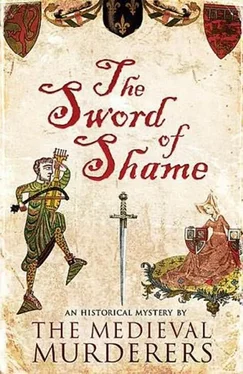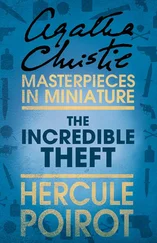The Medieval Murderers - Sword of Shame
Здесь есть возможность читать онлайн «The Medieval Murderers - Sword of Shame» весь текст электронной книги совершенно бесплатно (целиком полную версию без сокращений). В некоторых случаях можно слушать аудио, скачать через торрент в формате fb2 и присутствует краткое содержание. Жанр: Исторический детектив, на английском языке. Описание произведения, (предисловие) а так же отзывы посетителей доступны на портале библиотеки ЛибКат.
- Название:Sword of Shame
- Автор:
- Жанр:
- Год:неизвестен
- ISBN:нет данных
- Рейтинг книги:4 / 5. Голосов: 1
-
Избранное:Добавить в избранное
- Отзывы:
-
Ваша оценка:
- 80
- 1
- 2
- 3
- 4
- 5
Sword of Shame: краткое содержание, описание и аннотация
Предлагаем к чтению аннотацию, описание, краткое содержание или предисловие (зависит от того, что написал сам автор книги «Sword of Shame»). Если вы не нашли необходимую информацию о книге — напишите в комментариях, мы постараемся отыскать её.
Sword of Shame — читать онлайн бесплатно полную книгу (весь текст) целиком
Ниже представлен текст книги, разбитый по страницам. Система сохранения места последней прочитанной страницы, позволяет с удобством читать онлайн бесплатно книгу «Sword of Shame», без необходимости каждый раз заново искать на чём Вы остановились. Поставьте закладку, и сможете в любой момент перейти на страницу, на которой закончили чтение.
Интервал:
Закладка:
‘It was you,’ I said, nodding in the direction of Rowland Haskell, ‘who said at supper that you’d seen Master Shakespeare’s play about the mad Dane. You said there was a lot of silly talk in it, talk about hawks and handsaws and crabs going backwards.’
‘I remember,’ said Rowland, ‘but what has this to do with the death of our cousin?’
‘Because the person who carried the body out of the house took it only a few yards before depositing it on the ground. That was far enough to achieve the right effect.’
‘What effect?’ said Martha.
‘That Elias had been by himself when he died. That perhaps his death was the result of divine intervention-or demonic intervention I should say.’
I waited for someone to object but none of those seated round the table said a word.
‘Then, once the body had been tumbled onto the snowy ground, that same person was careful to retrace their steps-by walking backwards like a crab and treading in the imprints already left in the snow. That way it would appear that Elias was alone when he died.’
‘And the sword?’ said Cuthbert. ‘How do you explain that?’
‘I believe it was thrown from the doorway after Elias had been left on the ground. I remember thinking it odd that the sword was some distance from the body. Most likely it would have been too difficult for the individual who killed the old man to carry body and sword together. I suspect that he came back inside, and threw the sword from here.’
I gestured over my shoulder towards the door.
‘In God’s name, why?’ said Rowland. I noticed that the sneer had gone from his tones.
‘Because of that story about the sword being cursed and flying through the air of its own accord, and so on. I know it sounds unlikely, the kind of thing you might read in a story or fable. But this killing was not planned, I believe. It occurred on the spur of the moment. This was the best the murderer could come up with to give a kind of superstitious gloss to the whole business.’
‘Superstition!’ said Cuthbert, but not so dismissively as he had on the previous evening.
‘Well, you can stop looking in my direction,’ said Dame Elizabeth. ‘I have the body of a weak and feeble woman, you know, and could certainly not have carried my cousin on my shoulders and then thrown a massy sword out into the night. It’s preposterous.’
I wasn’t sure whether she was referring to the whole story I’d spun or only to the idea that she might have been the perpetrator. I admired the way in which she’d brought in our late, great Queen Elizabeth, who had described herself as a weak and feeble woman (but one having the stomach of a king) during the Spanish Armada of ’88. For all her protestations, though, I reckoned that this Elizabeth might have done it, for Elias was all skin and bone and there is no limit to what a determined woman may accomplish.
Now it was Valentine’s turn to pipe up.
‘You may leave me out of the reckoning too, Master Revill. Like my dear cousin Elizabeth I am far too old for all this. I have enough trouble lugging my own bones around.’
I was inclined to agree with him. He was quicker-witted than he looked and might be more robust too, but I doubted that that would extend to his cutting down his cousin and carrying him out of doors. So that left just the two of them, the lawyer Cuthbert and the merchant Rowland. It was interesting that no one had yet disputed this version of events, but I had been relying on my account to flush the guilty party from cover. Yet both Cuthbert and Rowland continued to look baffled. The silence lengthened.
There was a sudden crash from beyond the table. Abigail the housekeeper had dropped the jug of ale which she had been holding all this time. The jug shattered. This was no great disaster but a trifling household accident. Yet Abigail flung her hands to her face and rushed from the room, wailing. Nobody spoke. I looked down at the floor where what was left of the drink from the jug was being speedily absorbed by the rushes that were laid there. And I recalled the fresh rushes in Elias’s room, put down to dispel the scent of death-but laid even before Elias’s body had been returned to his chamber, before I’d been imprisoned there. Very meticulous the house-keeping in this place.
Unless, of course, the rushes were laid down by someone who perhaps wished to cover up fresh, bloody marks on the floor. And who was in a better position to put down a new covering of rushes and herbs, and to know where the stores of such things were kept, than the housekeeper of Valence?
Abigail.
Abigail, who had not merely renewed a floor covering but had changed her clothing as well. She was the sole member of the household to appear in a different outfit this morning. I’d taken her black smock for a mark of respect for her late master but suppose that the real reason for the change was that the old oatmeal-coloured smock was stained with blood, Elias’s blood? And, if we were looking now for someone who had the sinews to carry the old man outside and then to toss the sword into the snow after him, then Abigail certainly had the strength.
All this flashed through my mind much more quickly than it takes to put it down here. Indeed, my mind was still racing as I took off in pursuit of the housekeeper, followed by Martha and the others. We reached the door of the kitchen. It was shut. Meg’s sister was outside, looking confused and fearful. Abigail had ordered her out of the kitchen, and when the girl seemed to hesitate had seized her by the hair and dragged her to the door and pushed her to the far side of it. She’d then bolted it.
We listened at the door but could hear nothing. There was a window, Martha said, which gave onto the yard. We tore through the house and into the yard. The snow had turned slushy and the place where Elias’s body had lain was already no more than a vaguely darker shape on the ground. Round the wing of the house, and towards the back quarters where the kitchen was. The casement window was open, Abigail had not thought to secure herself that way.
But then she hadn’t needed to. All she wanted was to buy herself a few moments, enough to swallow the concoction that she must have had stored away for just such a terrible pass, to use either on herself or on another. By the time I’d climbed over the sill and entered the kitchen and unbarred the door to admit the others, it was too late.
Or almost too late. The housekeeper was dying but not quite dead. Perhaps she had misjudged the poison dose (which I think was aconite but am not absolutely sure) and so condemned herself to a few hours of life rather than a few minutes. She was carried, in great distress, to her private room which was scarcely larger than a cupboard. She lay on her trestle bed, shaking and sweating and bringing up terrible-smelling bile. The kitchen girl, Meg’s sister, attempted to give her an emetic but Abigail gestured her away. It was too late. We took it in turns to keep watch on her, for if she was a murderess she was also a dying woman, and afterwards the story was pieced together from our rags of testimony.
Abigail’s dying words were the most potent witness to her guilt that there could have been. Her dying words and her despairing choice of suicide, and one other thing which I’ll come to in a moment. But we heard-those of us clustered about her poor, wracked body-we heard that it had been she who had killed Elias with the sword. She hadn’t intended to kill him in that way, although she had been a long time killing him another way, by feeding him soporifics mixed with traces of belladonna. He had promised her part of his estate, as he had promised the cousins, and she was trying to hasten his demise. Otherwise he might never have gone, she said, he was a tough old bugger who’d’ve outlived them all.
Читать дальшеИнтервал:
Закладка:
Похожие книги на «Sword of Shame»
Представляем Вашему вниманию похожие книги на «Sword of Shame» списком для выбора. Мы отобрали схожую по названию и смыслу литературу в надежде предоставить читателям больше вариантов отыскать новые, интересные, ещё непрочитанные произведения.
Обсуждение, отзывы о книге «Sword of Shame» и просто собственные мнения читателей. Оставьте ваши комментарии, напишите, что Вы думаете о произведении, его смысле или главных героях. Укажите что конкретно понравилось, а что нет, и почему Вы так считаете.












